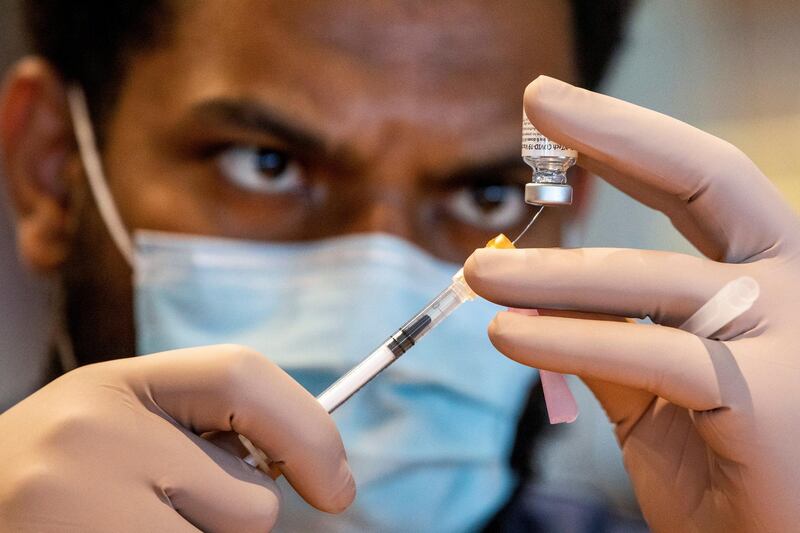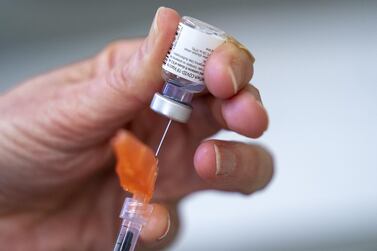The US said on Wednesday at the World Trade Organisation that it backed a temporary intellectual property waiver for Covid vaccines.
The move could allow suppliers in other countries to produce generic shots and speed up vaccinations before more coronavirus variants emerge.
The new stance marks an about-face on the position the US has held since October.
Washington sought to block a proposal to temporarily waive patent protections for vaccines, which was introduced by South Africa and India with the backing of more than 100 countries.
“This is a global health crisis and the extraordinary circumstances of the Covid-19 pandemic call for extraordinary measures,” US trade representative Katherine Tai said.
“The administration believes strongly in intellectual property protections but in service of ending this pandemic, supports the waiver of those protections for Covid-19 vaccines.”
These extraordinary times and circumstances of call for extraordinary measures.
— Ambassador Katherine Tai (@AmbassadorTai) May 5, 2021
The US supports the waiver of IP protections on COVID-19 vaccines to help end the pandemic and we’ll actively participate in @WTO negotiations to make that happen. pic.twitter.com/96ERlboZS8
The WTO convened in Geneva on Wednesday for a two-day meeting that largely focused on the waiver issue.
By dropping its opposition to the waiver, US President Joe Biden's administration opens a path for negotiations on its content, which Ms Tai said “will take time given the consensus-based nature” of the WTO.
Many other wealthy countries, particularly in Europe, are also on record as opposing the waiver, but Washington's backing is a significant first step on the path to an agreement.
Many of the key Covid vaccine makers, such as Pfizer, Moderna and Johnson & Johnson, are based in the US.
World Health Organisation Director-General Dr Tedros Adhanom Ghebreyesus called it a "monumental moment" in the pandemic.
“I commend the United States on its historic decision for vaccine equity and prioritizing the well-being of all people everywhere at a critical time," Dr Tedros said in a statement after the news.
"Now let's all move together swiftly, in solidarity, building on the ingenuity and commitment of scientists who produced life-saving Covid-19 vaccines.”
Diego Felipe, a spokesman for Doctors Without Borders, said the waiver should allow other companies to produce generic versions of Covid vaccines at cheaper rates, ensuring greater supply and accessibility.
"We all agree that we need diversification of production of vaccines, treatments and diagnostics," Mr Felipe told The National last month.
“Intellectual properties are one of the biggest bottlenecks.
“In our historical experience with other epidemics, we have clearly seen that, thanks to excessive intellectual property protections, there were a lot of delays in the production of alternative suppliers and cheaper versions, including for vaccines.”
Only 8 per cent of the global population has been fully vaccinated.
More than 80 per cent of those vaccinations have been administered in higher-income countries and less than 1 per cent has been given in low-income countries.
“There are figures that indicate that 85 countries will not get any significant levels of vaccination until 2023 if we keep this very same speed,” Mr Felipe said.
“In order to accelerate vaccination we need more supply options and that’s not coming true if we’re not taking political actions.
“Some companies like Pfizer even announced that they plan to increase the price of the doses.
"And we have seen over and over during past epidemics that these monopolies, this excessive overpricing of health technologies, not only creates problems in terms of the public health response but has pushed a lot of people into poverty.”
Disclosure forms indicate that Pfizer and other pharmaceutical companies have lobbied Congress against such a waiver.
They say that waiving intellectual property protection, even temporarily, stifles innovation.
But the Biden administration has come under pressure to back the waiver from left-leaning Democrats in Congress.
More than 100 House members sent a letter to Mr Biden last week urging him to drop opposition to the waiver.
Ten senators, led by Bernie Sanders of Vermont, also signed a similar letter to Mr Biden earlier in April.
Ms Tai pledged that the US would increase vaccine manufacturing and distribution, while raising the volume of raw materials needed to produce the vaccines.
After initial reluctance, the US agreed to send raw materials needed to produce the AstraZeneca vaccine to India, to help it cope with its surge in Covid cases.
Last month, the Biden administration appointed Gayle Smith, the former administrator for the US Agency for International Development, to oversee Washington's global vaccine diplomacy as it makes great progress in inoculating its population.







